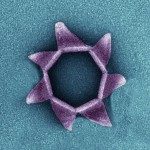Lien vers Pubmed [PMID] – 24024638
Annu. Rev. Microbiol. 2013;67:565-85
This review presents a personal account of research on archaeal viruses and describes many new viral species and families, demonstrating that viruses of Archaea constitute a distinctive part of the virosphere and display morphotypes that are not associated with the other two domains of life, Bacteria and Eukarya. I focus primarily on viruses that infect hyperthermophilic members of the phylum Crenarchaeota. These viruses’ distinctiveness extends from their morphotypes to their genome sequences and the structures of the proteins they encode. Moreover, the mechanisms underlying the interactions of these viruses with their hosts also have unique features. Studies of archaeal viruses provide new perspectives concerning the nature, diversity, and evolution of virus-host interactions. Considering these studies, I associate the distinctions between bacterial and archaeal viruses with the fundamental differences in the envelope compositions of their host cells.

